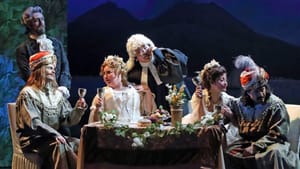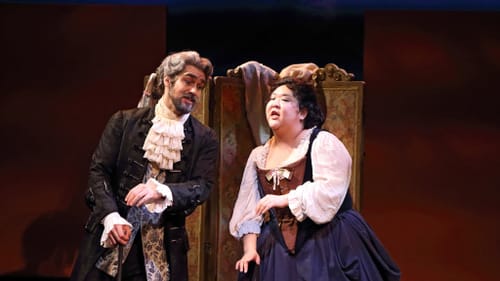Stay in the Loop
BSR publishes on a weekly schedule, with an email newsletter every Wednesday and Thursday morning. There’s no paywall, and subscribing is always free.
Too much, wanting more
The Academy of Vocal Arts presents Mozart’s ‘Cosí fan tutte’

“Does it have to look this ugly?” my friend asked at intermission of Mozart’s Cosí fan tutte, now in performance at the Academy of Vocal Arts (AVA). No, I thought to myself, it doesn’t have to. Yet it did.
Dorothy Danner’s production—performed on Peter Harrison’s by-the-numbers sets and featuring costumes (by Val J. Starr) that looked like they could’ve been rented—warranted no laurels for aesthetics or intellect. It featured one original idea, and it’s bad: a dumbshow enacted during the overture that imagines Mozart’s librettist, Lorenzo Da Ponte, crafting the story of the opera at his writing desk.
So it begins
Embodied by bass Brent Michael Smith, he then morphed into Don Alfonso, the piece’s mercurial prime mover. Alfonso is convinced of the inconstancy of women; he bets gullible soldiers Guglielmo (baritone Ethan Simpson) and Ferrando (tenor Oliver Sewell, substituting for an unwell Piotr Buszewski) that their fiancées, Fiordiligi (soprano Claire de Monteil) and Dorabella (mezzo Pascale Spinney), will drop them if they’re called to war.
So begins an opera that, nearly 230 years after its premiere, feels forward-looking and reductive in equal measures. The gender and sexual politics don’t adhere to our contemporary standards—the title, which has no literal English translation, is often rendered along the lines of “women are like that”—but it remains a marvel how Mozart and Da Ponte imbued each figure on stage with so much individuality and charm at a time when stock characterization still dominated. It’s telling that, aside from a small chorus heard briefly onstage, the six principal roles are the only ones.
Danner’s plodding direction regrettably stripped the piece of its wit, making for a long, obvious evening of predictable antics. (Even with standard cuts, the running time clocked in north of three hours.) Yet even as the production left you wanting so much more—and wondering why this was deemed an acceptable standard for one of the country’s leading conservatories—the level of singing on stage was unusually strong.
Rising voices
Top vocal honors went to mezzo Alice Chung, whose scene-stealing turn as the chambermaid Despina verged on grand larceny. Chung eschewed the hoary gestures one associates with the role—rather than daintily sipping hot chocolate from a teacup at her entrance, she chugged straight from the teapot—and the result infused her scenes with a sense of whimsy that’s largely absent elsewhere. Her barnburner of a voice may be a touch more forceful than one wants in this role, but it came in handy when she donned the disguise of a dotty doctor at the end of the first act.

Still in her first year at AVA, Chung has already delivered a powerfully dramatic Zia Principessa in Puccini’s Suor Angelica and a deliciously diabolical Ježibaba in Dvořák’s Rusalka. Given her range and talents, you can’t help expecting more great things to come.
De Monteil is well known to AVA audiences already, essaying several leading roles over the past two seasons, but the frequent prima donna showed that she can still surprise and delight. Her essentially dramatic instrument would benefit from a greater sense of Mozartian line, but it was thrilling to hear Fiordiligi’s music—often ceded these days to lighter voices—sung with such heft and ease. Her gorgeous assumption of the aching aria “Per pieta, ben mio, perdona” recalled Renée Fleming in her prime, as captured in Georg Solti’s 1996 recording for Decca.
Spinney has distinguished herself in several comprimaria roles; Dorabella was her most notable assignment to date at AVA. Her acting abilities will likely bloom if given more time center stage—at times here, she seemed awkward and disengaged. Vocally, though, she was entirely blue chip.
So too was Simpson—and a more dashing Guglielmo you couldn’t hope for. He partnered well with Sewell, whose tenor still shows the perceptible strain I first noticed in last year’s La Traviata. Still, he deserves commendation for standing in for an ailing colleague on minimal notice, and his instrument remains one to watch.
A traveling finish
The AVA Orchestra sounded better than I’ve heard in recent memory under the baton of musical director Christofer Macatsoris. He drew especially vivid coloring from the woodwinds in the overture, which contrasted nicely with the lean, muscular sound in the strings. He didn’t always prove the most supportive maestro for his singers, favoring a dirge-like tempo for “Come scoglio” (which De Monteil handled more than capably) and a choppy musical line in “Un’aura amorosa” (which caused Sewell some grief).
Cosí continued in Center City through March 9. Cosí travels to Centennial Hall at The Haverford School on March 12. Go for the exemplary music-making, if not necessarily the production.
What, When, Where
Cosí fan tutte. By Wolfgang Amadeus Mozart and Lorenzo Da Ponte, Dorothy Danner directed. Academy of Vocal Arts. Through March 9, 2019, at the Helen Corning Warden Theater, 1920 Spruce Street Philadelphia. Also March 12, 2019, at Centennial Hall, The Haverford School, 450 Lancaster Avenue, Haverford, Pennsylvania. (215) 735-1685 or avaopera.org.
Sign up for our newsletter
All of the week's new articles, all in one place. Sign up for the free weekly BSR newsletters, and don't miss a conversation.
 Cameron Kelsall
Cameron Kelsall